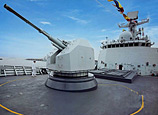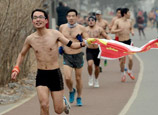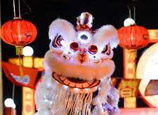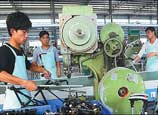
Renewed tradition
The tradition of zuoyuezi, which literally means sit for a month, dictates that new mothers must stay indoors and leave work to others during that period, usually elderly female relatives. Yet as incomes have grown in cities, families began to hire nannies, either for just that month or on a long-term basis.
Postnatal care centers started to spring up in the last five to eight years as one-stop shops staffed by nurses, gynecologists and obstetricians, pediatricians, nutritionists and psychologists. Some even boast five-star services, including swimming pools for babies and early education courses, but prices can be hefty too.
Chen Ye, 32, said she paid 110,000 yuan ($17,480) last year to stay at a center in Shanghai.
"The service was generally good," she said. "I didn't have to do anything. The center handled everything for me."
According to the China Domestic Service Association, there are now about 200 postnatal centers nationwide, mostly in major cities such as Beijing, Shanghai and Shenzhen.
However, experts say that regulations have failed to keep up with the sector's development.
"Postnatal centers are not even required to register with health authorities. They fall under a government's industrial and commercial office," said Liang Yun, deputy director of the Hunan Provincial Domestic Service Association, who also works with the China Healthcare Association. "Plus, they are still regarded as a new service, and there is no specific registration category."
This creates a serious problem when it comes to supervision, he added.
"Many businesses cut corners by registering under the category of healthcare or maternity care, but they don't have a special health license to open such a center."
CareBay Maternity Services, established in 2007, was among the first postnatal centers in China. It has three branches, two in Shanghai and one in Beijing, and a fourth is planned for Shenzhen. It charges from 70,000 yuan to 580,000 yuan for a month's stay.
Like many others involved in the sector, the center's publicity director Guo Ailin said the company understands that caring for mothers and their babies requires a strictly controlled environment, from temperatures to hygiene to nursing standards.
But there are still no national guidelines the centers need to adhere to, she said, which results in "many people thinking it's easy money and jumping into the market to take a piece of the cake. Most fail because they do not ensure quality".
She said CareBay has a long-term partnership with several hospitals to guarantee top medical care and regularly sends air samples for testing.
"We invite third-party, independent bodies to examine our work and sanitary conditions," she said, adding that the centers receive on average 100 women a month.
Zhang Wenkang, president of the China Maternal and Child Health Association, agreed that the authorities urgently need to update the regulations on postnatal centers.
"We need guidelines and standards to remove risks to new mothers and newborns," he added.
 |
















 China's 'leftover women' phenomenon arouses heated debate in West
China's 'leftover women' phenomenon arouses heated debate in West


![]()
